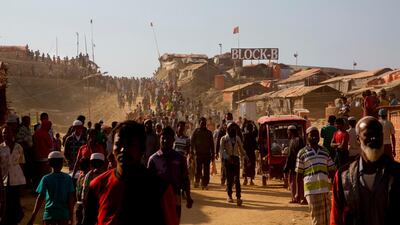The head of a UN fact-finding mission on Myanmar warned on Wednesday that “there is a serious risk of genocide recurring” against the Rohingya Muslim minority still living in the country.
“If anything, the situation of the Rohingya in Rakhine state has worsened,” Marzuki Darusman told the UN General Assembly's human rights committee.
Mr Darusman said the minority still suffered discrimination, segregation, restricted movement, insecurity and a lack of access to land, jobs, education and health care.
The government of the Buddhist-majority nation has refused to recognise Rohingya as citizens or even as one of its ethnic groups, rendering the vast majority stateless.
Myanmar’s military began a campaign against the Rohingya in August 2017 in response to an insurgent attack.
More than 700,000 Rohingya fled to neighbouring Bangladesh to escape what has been called an ethnic cleansing campaign involving mass rapes and killing, and burning of their homes. An estimated 600,000 remain in Myanmar.
The Independent International Fact-Finding Mission on Myanmar, which Mr Darusman led, said in its final report last month that Myanmar should be held responsible in international legal forums for alleged genocide against the Rohingya.
“There is a strong inference of continued genocidal intent on the part of the state in relation to the Rohingya and there is a serious risk of genocide recurring," he said on Wednesday.
“Myanmar is failing in its obligations under the Genocide Convention to prevent genocide, to investigate genocide and to enact effective legislation criminalising and punishing genocide.”
Mr Darusman said the fact-finding mission handed 1,227 interviews with victims and witnesses of crimes against the Rohingya to another UN body, the Independent Investigative Mechanism for Myanmar.
He said the material included “a list of over 150 people suspected of involvement in numerous international crimes".
Mr Darusman called on countries to support the investigation by the prosecutor of the International Criminal Court of alleged crimes on the Bangladesh-Myanmar border.
He also called for backing on plans for Gambia, on behalf of the Organisation for Islamic Co-operation, to pursue a case against Myanmar before the International Court of Justice for breaching the 1948 Genocide Convention.
In the absence of a referral by the UN Security Council of the situation in Myanmar to the ICC, he said: “These initiatives are all the more important.”
Mr Darusman urged the assembly to also consider additional measures, including establishment of a tribunal like that set up by the UN for crimes in Rwanda and the former Yugoslavia.
Myanmar’s UN ambassador, Hau Do Suan, said his government did not recognise the fact-finding mission, calling its views one-sided and based on “misleading information and secondary sources".
He said the mission ignored the situation of the Hindu minority and other ethnic minorities in Rakhine state.
He said Myanmar’s government took its accountability seriously and that perpetrators of all human rights breaches “causing the large outflow of displaced persons to Bangladesh must be held accountable".
But Yanghee Lee, the UN's independent investigator on Myanmar, told the assembly that an independent commission of inquiry formed by Myanmar’s government “does not represent a possible end to this impunity".
“It has not produced a single report after nearly 15 months,” Ms Lee said.
She urged the international community to impose sanctions on companies owned by Myanmar’s military and on “its commanders most responsible for serious violations".
Ms Lee said there was no discernible improvement in the human rights situation in Myanmar.
“Discrimination against religious minorities continues unabated,” she said. “I am informed of 27 villages that describe themselves as Muslim-free, banning Muslims from entry.”
Myanmar’s government barred Mr Darusman and Ms Lee from entering the country, and both said it was unsafe for the Rohingya refugees to return from Bangladesh.

